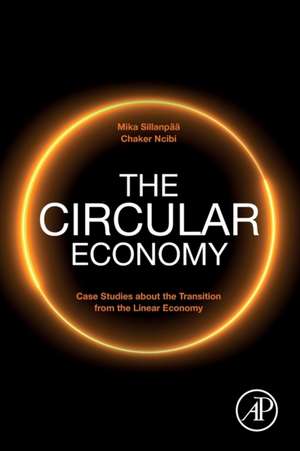The Circular Economy: Case Studies about the Transition from the Linear Economy
Autor Mika Sillanpää, Chaker Ncibien Limba Engleză Paperback – aug 2019
- Compiles evidence through case studies that illustrate how individuals, organizations, communities and countries are transitioning to a circular economy
- Provides a theoretical and empirical summary of the circular economy that emphasizes what others are actually doing and planning
- Highlights achievements from industry, agriculture, forestry, energy, water and other sectors that show how circular principles are applicable, eco-friendly, profitable, and thus sustainable
Preț: 573.05 lei
Preț vechi: 785.60 lei
-27% Nou
109.69€ • 119.19$ • 92.20£
Carte tipărită la comandă
Livrare economică 14-28 aprilie
Specificații
ISBN-10: 0128152672
Pagini: 344
Dimensiuni: 152 x 229 x 19 mm
Greutate: 0.46 kg
Editura: ELSEVIER SCIENCE
Public țintă
Upper-division undergraduates, graduate students, and researchers working on theories and applications associated with economic sustainabilityCuprins
1. Getting hold of the circular economy concept 2. Circular economy: Here and now 3. Accelerating the implementation of circular economy 4. Circular economy in action: reconciling profitability with sustainability 5. Sustainable wealth for all nations 6. Circular economy and sustainable development 7. Full "circular" ahead
Descriere
The Circular Economy: Case Studies about the Transition from the Linear Economy explores examples of the circular economy in action. Unlike other books that provide narrow perceptions of wide-ranging and highly interconnected paradigms, such as supply chains, recycling, businesses models and waste management, this book provides a comprehensive overview of the circular economy from various perspectives. Its unique insights into the approaches, methods and tools that enable people to make the transformation to a circular economy show how recent research, trends and attitudes have moved beyond the "call to arms" approach to a level of maturity that requires sound scientific thinking.
- Compiles evidence through case studies that illustrate how individuals, organizations, communities and countries are transitioning to a circular economy
- Provides a theoretical and empirical summary of the circular economy that emphasizes what others are actually doing and planning
- Highlights achievements from industry, agriculture, forestry, energy, water and other sectors that show how circular principles are applicable, eco-friendly, profitable, and thus sustainable
